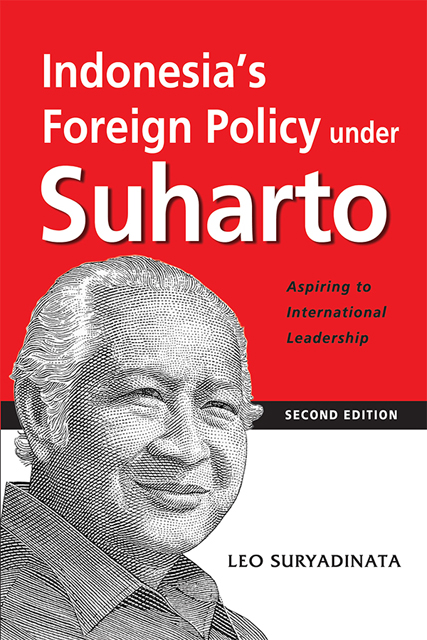Book contents
- Frontmatter
- Contents
- Preface to the Second Edition
- Preface
- Acknowledgements
- Introduction: Suharto’s Foreign Policy
- 1 Determinants of Indonesia’s Foreign Policy: In Search of an Explanation
- 2 Indonesia’s Foreign Policy before the New Order: In Search of a Format
- 3 Indonesia’s Foreign Policy during the “New Order” (I): The Rise of the Military
- 4 Indonesia’s Foreign Policy during the “New Order” (II): The Assertive Role of the President
- 5 Indonesia’s Relations with the ASEAN States: Regional Stability and Leadership Role
- 6 Indonesia’s Relations with Australia and Papua New Guinea: Security and Cultural Issues
- 7 Indonesia-China Relations: Ideology, Ethnic Chinese and the President
- 8 Indonesia-Vietnam Relations and the Kampuchean Issue: The Security Factor
- 9 Indonesia-Superpower Relations: Economic and Non-Economic Factors
- 10 Indonesia, the Middle East and Bosnia: Islam and Foreign Policy
- 11 Indonesia, the Non-Aligned Movement and APEC: In Search of a Leadership Role
- Conclusion: To Lead and Not to Be Led
- Postscript: Indonesia’s Foreign Policy from the Fall of Suharto to Joko Widodo: Still Aspiring to International Leadership?
- Bibliography
- Appendices
- Index
6 - Indonesia’s Relations with Australia and Papua New Guinea: Security and Cultural Issues
Published online by Cambridge University Press: 01 September 2023
- Frontmatter
- Contents
- Preface to the Second Edition
- Preface
- Acknowledgements
- Introduction: Suharto’s Foreign Policy
- 1 Determinants of Indonesia’s Foreign Policy: In Search of an Explanation
- 2 Indonesia’s Foreign Policy before the New Order: In Search of a Format
- 3 Indonesia’s Foreign Policy during the “New Order” (I): The Rise of the Military
- 4 Indonesia’s Foreign Policy during the “New Order” (II): The Assertive Role of the President
- 5 Indonesia’s Relations with the ASEAN States: Regional Stability and Leadership Role
- 6 Indonesia’s Relations with Australia and Papua New Guinea: Security and Cultural Issues
- 7 Indonesia-China Relations: Ideology, Ethnic Chinese and the President
- 8 Indonesia-Vietnam Relations and the Kampuchean Issue: The Security Factor
- 9 Indonesia-Superpower Relations: Economic and Non-Economic Factors
- 10 Indonesia, the Middle East and Bosnia: Islam and Foreign Policy
- 11 Indonesia, the Non-Aligned Movement and APEC: In Search of a Leadership Role
- Conclusion: To Lead and Not to Be Led
- Postscript: Indonesia’s Foreign Policy from the Fall of Suharto to Joko Widodo: Still Aspiring to International Leadership?
- Bibliography
- Appendices
- Index
Summary
Introduction
Although Indonesia’s relations with Australia are not as important to it as its relations with the ASEAN states, it is clear that Indonesia has been concerned with Australia. This has become particularly evident after the “liberation of West Irian” (now Irian Jaya) and more recently, since the annexation of East Timor. Two issues have coloured Jakarta-Canberra relations — the East Timor problem and Indonesia’s policy towards Papua (i.e. eastern) New Guinea (PNG). This chapter examines recent relations between Indonesia and Australia during the New Order period, especially after the annexation of East Timor, and also considers Indonesia’s relations with PNG.
Indonesia-Australia Relations
Early relations between Jakarta and Canberra were cordial. Australia was among the few Western nations which were sympathetic to Indonesia’s claim for independence. The relationship began to cool once Jakarta adopted a militant foreign policy. Indonesia’s campaign to “liberate West Irian” caused tension between Jakarta and Australia because Canberra was concerned with the security of Papua New Guinea, then Australian “territory”. Australia was suspicious of Sukarno’s policy as the Government feared he might not stop in West Irian. Australian suspicions were strengthened by Indonesia’s konfrontasi policy with Malaysia. Relations between Indonesia and Australia began to improve after the fall of Sukarno and the emergence of Suharto, before the East Timor problem became the major issue between Jakarta and Canberra.
In 1974, Portugal underwent a “revolution” which resulted in its decision to grant self-government to its colony, East Timor. The decolonization process was far from smooth. Internal conflict and the emergence of the left-wing Fretilin were perceived by Suharto’s Indonesia as a threat to Indonesian political stability. Jakarta was afraid that an independent East Timor under Fretilin might become the Cuba of South east Asia. In addition, Indonesia also saw the East Timorese as their “lost brothers”. As a result, Indonesia intervened and eventually incorporated the Portuguese ex-colony into the Republic.
In 1974, when Labor Prime Minister of Australia, Gough Whitlam, visited Indonesia, Suharto sounded him out on the East Timor issue. It was reported that Australia would have no objection if the territory was peacefully integrated into Indonesia. When Indonesia annexed East Timor by force, however, the Australian public was not willing to accept the situation. Even the Labor Government was critical of Indonesia’s action and Australia criticized Indonesia in the United Nations.
- Type
- Chapter
- Information
- Indonesia's Foreign Policy under SuhartoAspiring to International Leadership, pp. 91 - 100Publisher: ISEAS–Yusof Ishak InstituteFirst published in: 2023

